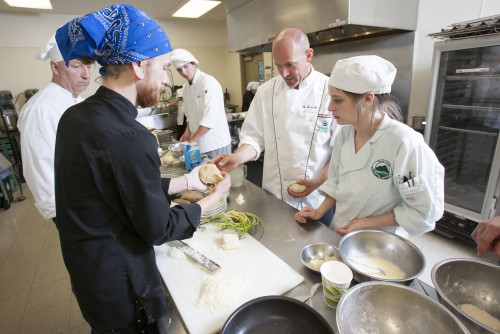Hospitality Management AS-T Degree
Provides students with the opportunity to meet the requirements for transfer to a CSU and major in Hospitality Management.
Associate in Science for Transfer | SC Program: AS-T.2006
The course of study in hospitality includes instruction in hotel and restaurant operations designed to prepare students for various positions in the hospitality industry. Excellent job prospects exist with employers at hotels/motels, restaurants, clubs, cafeterias, food manufacturing companies, contract food service providers, schools, airlines, railways, and cruise ship companies.
The Associate in Science in Hospitality Management for Transfer Degree (AS-T Hospitality Management) provides students with the opportunity to meet the requirements for transfer to the California State University system in Hospitality Management. In order to earn this degree a student must complete 60 required semester units of CSU-transferable coursework with a minimum GPA of 2.0. Completing this degree guarantees admission to the CSU system but not to a particular campus or major. The degree is designed to prepare students for upper division study in Hospitality Management.
Hospitality Management graduates at the bachelor’s level are qualified for employment by industry in a variety of jobs, in areas such as food and beverage management, safety and sanitation, culinary operations, and lodging in this transfer program.



Choose your path
Map your education by viewing the program map for the degree or certificate you’re interested in earning below. Meet with a counselor to create your official comprehensive education plan.
A program map shows all the required and recommended courses you need to graduate and a suggested order in which you should take them. The suggested sequence of courses is based on enrollment and includes all major and general education courses required for the degree.
Fall Semester, First Year
16 Units TotalThis course develops the reading, critical thinking, and writing skills necessary for academic success, emphasizing expository and argumentative writing as well as research and documentation skills. As a transferable course, it presupposes that students already have a substantial grasp of grammar, syntax, and organization, and that their writing is reasonably free from errors. A research paper is required for successful completion of the course. This course may be offered in a distance education format.
This course will provide instruction in the proper use of safety and sanitation principles and practices for personal and institutional application. Methods and techniques for handling foods safely are examined, including food preparation, storage, service, and the prevention of food contamination. Also covered are the importance of microorganisms, food borne illness and food allergies, sanitary facilities and equipment, accident prevention, crisis management, and pest management. Compliance with city, state, and federal health regulation as embodied in HACCP (Hazard Analysis Critical Control Point) are emphasized, along with the supervisor's responsibilities in maintaining high standards of these principles. This course will provide updated information on USDA, FDA, Codex, and ISO 24,000 regulations and their relationship to food borne illness. The student receives a certificate of completion from the Educational Foundation of the National Restaurant Association upon the successful completion of this course with a passing grade of 75% or higher. This course will provide the safe use of culinary equipment and its proper use to avoid accidents. This course is required for all Culinary Arts/Culinary Management students and is advised to be taken as the first course prior to all other culinary courses or in conjunction with the first few. It may be used for American Culinary certification and recertification, and is required for the Dietary Service Supervisor Certificate offered by the Nutrition Department. This course may be offered in a distance education format.
Spring Semester, First Year
14 Units TotalThis course is an introduction to the process of human communication with an emphasis on small groups. Subjects covered are preparation for discussion, group participation, leadership, decision-making, interpersonal relations, managing diversity, critical thinking/problem-solving, managing conflict, and evaluation of group interaction. Students will be involved in group interactions, and emphasis will be on practical experience. College-level writing skills will be expected on all papers, outlines, and short essays. This course may be offered in a distance education format.
This is a survey course designed for non-science majors. It spans the Earth-related sciences, including geology, oceanography, meteorology, and astronomy. In general, the course focuses on physical processes and materials as related to each discipline. Topics include the geologic evolution of the Earth, economic resources derived from the Earth, Earth materials, evolution and character of the oceans, ocean-atmosphere interactions, atmospheric processes including weather and climate, the solar system and Earth as part of the universe. Using an Earth systems approach, lecture and laboratory will consider concepts centered on the sustainable use of natural resources. The laboratory portion of this course provides hands-on activities that support and demonstrate lecture concepts. This course may be offered in a distance education format.
The Hospitality Work Experience Education course allows the student to gain on-the-job experience through employment/volunteerism at an approved hospitality job site that is acquired by the student and related to the student's major. A faculty member supervises all WEE courses to ensure that the work experience is of educational value. The course stresses good work habits and meeting of competencies through actual on-the-job performance. A student may repeat this course since course content varies and skills are enhanced by supervised repetition and practice. A maximum of 14 units may be earned in a single semester.
Fall Semester, Second Year
15 Units TotalThis course is a survey of the history of the United States from Pre-Columbian Peoples to the end of Reconstruction. Topics include contact and settlement of America, the movement toward independence, the formation of a new nation and Constitution, westward expansion and manifest destiny, the causes and consequences of the Civil War, and Reconstruction. This course satisfies the CSU requirement for US History (US-1). This course may be offered in a distance education format.
This course is an introduction to United States and California government and politics, including their constitutions, political institutions and processes, and political actors. An examination of political behavior, political issues, and public policy, this course satisfies the CSU requirement in U.S. Constitution and California State and local government (US-2 and US-3). This course may be offered in a distance education format.
This course is a study of the basic institutions and principles of microeconomics and so it concentrates on the parts of an economic system: the markets, the producers, the consumers, and the structures of basic industries, along with systems for relative resource use and income determination. This course may be offered in a distance education format.
Spring Semester, Second Year
15 Units TotalThis course is a comparative survey of the major ancient world civilizations which developed between 3500 B.C.E. and 1500 C.E. It examines political institutions, religious ideologies, the rise and fall of empires, and the major cultural innovations of each of the major world civilizations. This course may be offered in a distance education format.
This course is an introduction to the conservation or wise use of natural resources and incorporates discussions about the complex relationships of man to the environment. Students will learn about the diverse agencies that manage our resources along with their history and philosophies. The course will cover each of the major natural resources - such as water, air, energy, forests, wildlife, agriculture, and soils - as well as environmental policy and laws that govern the use of these resources. An emphasis is placed on the practical components of Environmental Science as it relates to social and economic aspects of conservation. This course may be offered in a distance education format.
This course takes an interdisciplinary approach to the study of race and ethnicity in the United States. It examines social justice movements in relation to ethnic and racial groups in the United States to provide a basis for a better understanding of the socioeconomic, cultural, and political conditions among key social groups including, but not limited to, Native Americans, African Americans, Asian Americans, and Latina/o Americans. This course examines the systemic nature of racial/ethnic oppression through an examination of key concepts including racialization and ethnocentrism, with a specific focus on the persistence of white supremacy. Using an anti-racist framework, the course will examine historical and contemporary social movements dedicated to the decolonization of social institutions, resistance, and social justice. This course may be offered in a distance education format.
Please see a counselor to discuss options for meeting general education requirements for transfer to California State Universities (CSU) and/or University of California (UC) campuses, as well as any specific additional courses that may be required by your chosen institution of transfer.
*Alternative Courses: Please see a Shasta College counselor for alternative course options. You can also view the following to find other courses to meet degree/certificate requirements:
- California State Universities – General Education
- IGETC – Intersegmental General Education Transfer Curriculum
Need a print out? Feel free to download and/or print out a copy of the sample program map(s).
Contact Us for More Information
Counseling & Student Services
Contact InfoAcademic/Instructional Division Office
Start Your Future at Shasta College
We are dedicated to helping you reach your educational and career goals. To begin your journey, apply for admissions today!
